Introduction:
Choosing the best strings for your acoustic guitar can have a profound impact on your instrument’s sound and playability. The right set of strings can optimize the way you play, as well as the tone produced by your guitar. We’ll dive into a range of string options available for every type of guitarist in this extensive guide to the best acoustic guitar strings based on all considerations including material, gauge, coating and brand recognition. 8 Best Acoustic Guitar Strings To Choose
Table of Contents
What to Consider When Choosing Acoustic Guitar Strings
Before we look at specific string recommendations I think it’s important to understand some of the main factors that will affect how a set of acoustic guitar strings sound and feel.
1. Material: Acoustic guitar strings are usually made of bronze, phosphor bronze, or coated variations and each material provides a unique tonal quality.
2. Gauge: The gauge (thickness) of the strings have an impact on both playability and sound. Light gauge strings are easier to play but have a softer tone, heavy gauges on the other hand will sound fuller but require more finger strength.
3. Coating: Coated strings will last longer as they are resistant to corrosion from sweat and oils, however, they may feel a little different and sound slightly different as well compared to non-coated strings.
4. Brand Reputation: There are a few brands in the marker who manufacture excellent quality strings which perform consistently. Opting for such renowned brands can guarantee the best quality of strings suiting your needs.
Top Acoustic Guitar Strings:
1. Elixir Nanoweb Phosphor Bronze:
For their special ultra-thin coating that makes strings of Elixir well-known for the long service life and excellent tone.
Material: Phosphor Bronze
Gauge Options: Extra light to medium.
Coating: Nanoweb coating provides long-lasting protection against corrosion
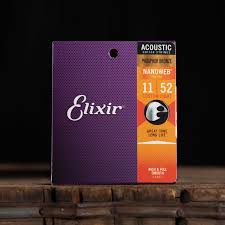
Sound: Bright, clear tone with a balanced frequency response.
Playability: This guitar feels smooth and easy on the fingers, perfect for playing for long periods of time.
Durability: Extraordinary long life due to coating which stops dirt and sweat from penetrating into the windings.
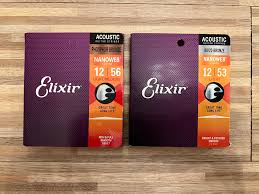
2. D’Addario EJ16 Phosphor Bronze:
One of the biggest names in guitar strings, you can trust D’Addario and their EJ16 set is popular with a lot of acoustic guitar players.
Material: Phosphor Bronze.
Gauge Options: Light gauge (0.012-0.053).
Coating: Uncoated.
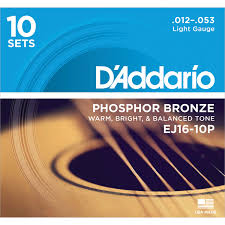
Sound: Warm, balanced tone with excellent projection.
Playability: Comfortable to play, with consistent tension across the strings.
Durability: Good lifespan, although not as long as coated strings.
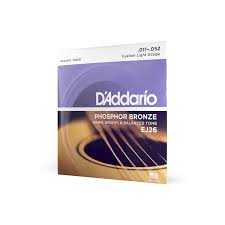
3. Ernie Ball Earthwood 80/20 Bronze:
Ernie Ball’s Earthwood series are really bright and alive sounding strings most frequently used by guitar players in all types of music.
Material: 80/20 Bronze (80% copper, 20% zinc)
Gauge Options: Available in a wide range of gauges from extra light to medium.
Coating: Uncoated.
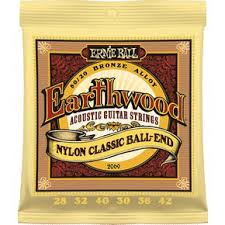
Sound: Bright, crisp tone with strong treble presence.
Playability: Smooth feel, good for both strumming and fingerpicking.
Durability: Moderate lifespan, can wear out faster than coated strings.

4. Martin SP Lifespan Phosphor Bronze:
Martin makes great strings that sound excellent, and the SP Lifespan series is meant to last.
Material: Phosphor Bronze.
Gauge Options: Available in multiple gauges, including custom light.
Coating: Treated with a proprietary coating for extended life.
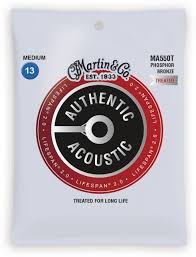
Sound: Rich, warm tone with excellent sustain.
Playability: Smooth and easy to play, with consistent tension.
Durability: Long-lasting due to the coating, ideal for frequent players.
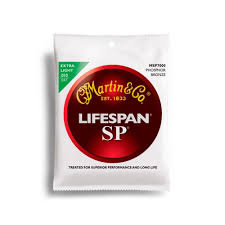
5. John Pearse Phosphor Bronze:
Many professional players prefer John Pearse strings because of their fantastic tone and integrity.
Material: Phosphor Bronze.
Gauge Options: Available in various gauges.
Coating: Uncoated.
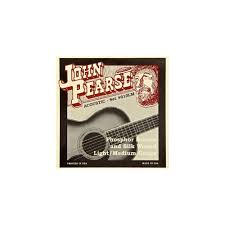
Sound: Warm, full-bodied tone with great depth.
Playability: Comfortable to play, with excellent intonation.
Durability: High lifespan for the strings, except for uncoated strings which you need to change more often.
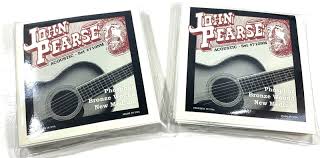
6. GHS Strings Bright Bronze:
GHS presents their version of actual bronze strings with the Bright Bronze series, recognized for their unique tone.
Material: 85/15 Bronze (85% copper, 15% zinc).
Gauge Options: Available in multiple gauges.
Coating: Uncoated.
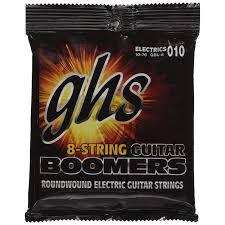
Sound: Bright, articulate tone with clear mids and highs.
Playability: Smooth feel, easy on the fingers.
Durability: Moderate lifespan, typical of uncoated strings.
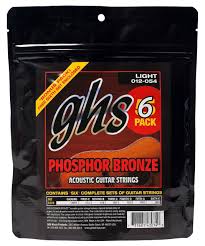
8. Cleartone Phosphor Bronze:
Cleartone strings are built to last and sound great, with a thin coating that won’t dull your tone.
Material: Phosphor Bronze.
Gauge Options: Available in various gauges.
Coating: EMP (Enhanced Molecular Protection) coating for longevity.
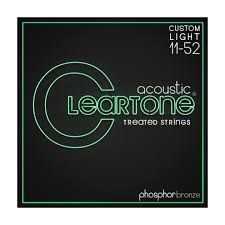
Sound: Bright, clear tone with good sustain.
Playability: Comfortable feel, good for both strumming and fingerpicking.
Durability: Excellent lifespan due to the EMP coating.
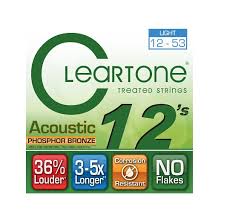
How to Choose the Right Strings for Your Playing Style
Consider the following factors to help you decide which acoustic guitar strings are the best choice for you and your playing style and preferences:
1.Fingerstyle Players: If you play fingerstyle you might like light gauge strings (.011-.052) to make it easier to move around your fingers and get a softer feel. Phosphor bronze strings are the most popular with fingerstyle players and are known for their warm and articulate sound.
2.Strummers: If you primarily strum, medium gauge strings (e.g., .013-.056) will give you a fuller, louder sound and last longer. Bronze or phosphor bronze strings will give you a bright, powerful tone that’s great for strumming.
3.Flatpickers: Light-medium or medium gauge strings are the best options for flatpicking to get an equal balance of ease of play and robust sound. The phosphor bronze strings are the good option for their clear, rich tone.
4.All-Rounders: If you play a variety of styles, try some custom light gauge strings (.012-.054), they’re versatile and have a well balanced tone.
Maintaining Your Acoustic Guitar Strings
The foremost thing to make your acoustic guitar strings serve you for a long time and sound well is taking good care of them. Below are some hints on how to help you keep your strings in shape and continue to sound fresh:
Clean Your Hands: Always wash your hands before playing to minimize the transfer of oils and dirt to the strings.
Using a dry cloth wipe it after playing: After every playing session you should use a clean cloth to wipe away the sweat and dirt.
Keep in mind the following when storing your guitar: Make sure you have a case to keep it when you are not using it so as to keep off dust which may tamper with the string.
Use String Cleaners: There are specialized string cleaners available that you can use to remove the buildup and extend the life of your strings.
Regular String Changes: No matter how much you take care of your strings, they will wear out no matter what. Change them on a regular basis to keep your sound quality and playability at their best.
Conclusion
The acoustic guitar strings you choose can have a major impact on your playing and the sound of your guitar. There are strings that will make your guitar sound brighter, strings that will make it sound warmer, coated strings that will last longer and more. If you like the bright and crisp tone of new strings, uncoated acoustic guitar strings such as Ernie Ball Earthwood 80/20 Bronze may be what you’re looking for. On the other hand, if you want your strings to last as long as possible then you may want to try coated strings such as Elixir Nanoweb Phosphor Bronze. If you’re not sure which type of acoustic guitar string is right for you, I would suggest trying either D’Addario EXP Coated or Elixir Nanoweb Phosphor Bronze as they both sound great and have good longevity. Acoustic Guitar Strings are made out of different materials including bronze (used on over 90% of sets), brass, phosphor bronze, nickel plated steel, silk and steel as well as nylon. You also need to take into consideration the gauge or thickness of the acoustic guitar string when making a purchase. Heavier gauged strings will deliver more volume and fuller tones but tend to be harder on the fingers. For many beginner guitarist I usually recommend extra light gauge acoustic guitar strings since they feel easier on your fingers when you first start learning to play but still provide enough volume and sustain. Another thing that should be mentioned is not all brands are created equally! That’s why I recommend sticking with reputable brands until further notice. Most importantly remember… there’s no right answer. It’s up to each person’s individual taste.
